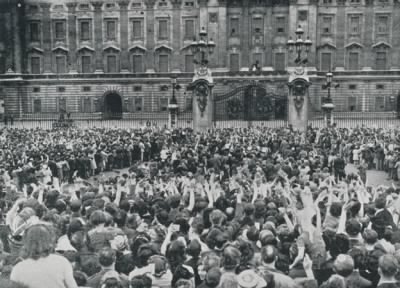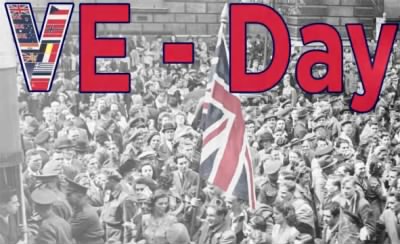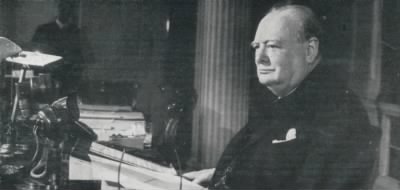VE Day
Victory in Europe Day
VE Day - or 'Victory in Europe Day’ - also became known as the ‘day of the people’ and everybody had their way of celebrating, and also remembering the fallen, of not just the Second World War but also the First World War
By the time Adolf Hitler committed suicide in his Führerbunker on 30th April 1945 to avoid capture, the Soviet Army was in Berlin. Before his death, Hitler named Grand Admiral Karl Donitz as his successor as Head of State and Supreme Commander of the German Armed Forces. On 2nd May General Helmuth Weidling, the commander of the Berlin Defense Area accepted the unconditionally surrendered the city to the Soviets. The surrender of the German forces in North-West Germany, Denmark, and the Netherlands were signed at Field Marshal Bernard Law Montgomery’s tent at Lüneburg Heath, south of Hamburg, by Donitz representative Admiral Hans-Georg von Friedeburg. Another surrender document was signed on 7th May 1945 at SHAEF headquarters in Reims, France, by General Alfred Jodl, the Chief-of-Staff of the German Armed Forces High Command. Jodl signed an unconditional surrender document for all German forces to the Allies and this was ratified in Berlin the following day. At midnight on 8th May 1945, the war in Europe was over.
What is VE Day?
VE Day - or 'Victory in Europe Day’ - also became known as the ‘day of the people’ and everybody had their way of celebrating, and also remembering the fallen, of not just the Second World War but also the First World War. Britain had just gone through six years of hardship, suffering, bravery and endurance, so you can imagine the scenes of jubilation and reflection that were evoked by the announcement from Winston Churchill that war with Germany was over.
VE Day marked victory for Europe over Germany, though it did not mark the end of World War Two. The war carried on in the Pacific and it was not until the Japanese surrendered on August 15th, 1945 that the Second World War ended. However, the Japanese administration under General Koiso did not officially surrender with a signed document until September 2nd, 1945, so both of these dates are now known as VJ Day.
VE Day Celebrations
As Churchill walked to a Service of Thanksgiving at St Margaret’s, Westminster, he was engulfed by an ecstatic, cheering crowd, all wanting to shake his hand and pour out their relief and gratitude. Even the two princesses, both teenagers at the time, got in on the act according to the Reader’s Digest’s ‘The World at Arms’. For once in a way their father the King allowed them to venture out mingle with the crowds, and wrote later in his diary, ‘Poor darlings, they have never had any fun yet.’
Many felt similarly shaky about the future, but as lights all over London blazed forth on the evening of VE Day, having been dark for almost 6 long years, not to mention bonfires and fireworks, floodlights and searchlights, the children’s eyes shone with excitement. All over the country many people dressed up in the patriotic red, white and blue, held parties, drank, danced and sang.
Below is the text of the broadcast in which, at 3pm British Double Summer Time on May 8, 1945, Mr. Winston Churchill announced the end of the fighting in Europe. Later the same day, H.M. the King broadcast his own message of thanksgiving, which is also reproduced.
Mr. Churchill, Prime Minister of the United Kingdom, announces the end of the war in Europe:
Yesterday morning at 2.41 a.m. at headquarters, General Jodl, the representative of the German High Command, and Grand Admiral Dönitz, the designated head of the German State, signed the act of unconditional surrender of all German land, sea, and air forces in Europe to the Allied Expeditionary Force, and simultaneously to the Soviet High Command.
General Bedell Smith, Chief of Staff of the Allied Expeditionary Force, and General Francois Sevez signed the document on behalf of the Supreme Commander of the Allied Expeditionary Force, and General Susloparov signed on behalf of the Russian High Command.
Today this agreement will be ratified and confirmed at Berlin, where Air Chief Marshal Tedder, Deputy Supreme Commander of the Allied Expeditionary Force, and General de Lattre de Tassigny will sign on behalf of General Eisenhower. Marshal Zhukov will sign on behalf of the Soviet High Command. The German representative will be Field-Marshal Keitel, Chief of the High Command, and the Commanders-in-Chief of the German Army, Navy, and Air Forces.
Hostilities will end officially at one minute after midnight tonight (Tuesday, May 8), but in the interests of saving lives the “Cease Fire” began yesterday to be sounded all along the front, and our dear Channel Islands are also to be freed today.
The Germans are still in places resisting the Russian troops, but should they continue to do so after midnight they will, of course, deprive themselves of the protection of the laws of war, and will be attacked from all quarters by the Allied troops. It is not surprising that on such long fronts and in the existing disorder of the enemy the commands of the German High Command should not in every case be obeyed immediately. This does not, in our opinion, with the best military advice at our disposal, constitute any reason for withholding from the nation the facts communicated to us by General Eisenhower of the unconditional surrender already signed at Rheims, nor should it prevent us from celebrating today and tomorrow (Wednesday) as Victory in Europe days.
Today, perhaps we shall think mostly of ourselves. Tomorrow, we shall pay a particular tribute to our Russian comrades, whose prowess in the field has been one of the grand contributions to the general victory.
The German war is therefore at an end. After years of intense preparation, Germany hurled herself on Poland at the beginning of September 1939; and, in pursuance of our guarantee to Poland and in agreement with the French Republic, Great Britain, and the British Empire and Commonwealth of Nations, declared war upon this foul aggression. After gallant France had been struck down we, from this island and from our united Empire, maintained the struggle single-handedly for a whole year until we were joined by the military might of Soviet Russia and later by the overwhelming power and resources of the United States of America.
Finally, almost the whole world was combined against the evil-doers, who are now prostrate before us. Our gratitude to our splendid Allies goes forth from all our hearts in this island and throughout the British Empire.
We may allow ourselves a brief period of rejoicing; but let us not forget for a moment the toil and efforts that lie ahead. Japan, with all her treachery and greed, remains unsubdued. The injury she has inflicted on Great Britain, the United States, and other countries, and her detestable cruelties, call for justice and retribution. We must now devote all our strength and resources to the completion of our task, both at home and abroad. Advance, Britannia! Long live the cause of freedom! God save the King!
(Winston Churchill)
Message from H.M. the King to his peoples broadcast on May 8th, 1945:
Today we give thanks to Almighty God for a great deliverance.
Speaking from our Empire’s oldest capital city, war-battered but never for one moment daunted or dismayed – speaking from London, I ask you to join with me in that act of thanksgiving.
Germany, the enemy who drove all Europe into war, has finally been overcome. In the Far East we have yet to deal with the Japanese, a determined and cruel foe. To this we shall turn with the utmost resolve and with all our resources. But at this hour, when the dreadful shadow of war has passed from our hearts and homes in these islands, we may at last make one pause for thanksgiving and then turn our thoughts to the tasks all over the world which peace in Europe brings with it.
Let us remember those who will not come back, their constancy and courage in battle, their sacrifice and endurance in the face of a merciless enemy; let us remember the men in all the Services and the women in all the Services who have laid down their lives. We have come to the end of our tribulation, and they are not with us at the moment of rejoicing.
Then let us salute in proud gratitude the great host of the living who have brought us to victory. I cannot praise them to the measure of each one’s service, for in a total war the efforts of all rise to the same noble height and all are devoted to the common purpose. Armed or unarmed, men and women, you have fought, striven and endured to your utmost. No one knows that better than I do; and as your King I thank with a full heart those who bore arms so valiantly on land and sea, or in the air; and all civilians who, shouldering their many burdens, have carried them unflinchingly without complaint.
With those memories in our minds, let us think what it was that has upheld us through nearly six years of suffering and peril. The knowledge that everything was at stake: our freedom, our independence, our very existence as a people; but the knowledge also that in defending ourselves we were defending the liberties of the whole world; that our cause was the cause not of this nation only, not of this Empire and Commonwealth only, but of every land where freedom is cherished and law and liberty go hand in hand. In the darkest hours we knew that the enslaved and isolated peoples of Europe looked to us; their hopes were our hopes; their confidence confirmed our faith. We knew that, if we failed, the last remaining barrier against a world-wide tyranny would have fallen in ruins. But we did not fall. We kept our faith with ourselves and with one another; we kept faith and unity with our great allies. That faith and unity have carried us to victory through dangers which at times seemed overwhelming.
So, let us resolve to bring to the tasks which lie ahead the same high confidence in our mission. Much hard work awaits us, both in the restoration of our own country after the ravages of war and in helping to restore peace and sanity to a shattered world…
There is great comfort in the thought that the years of darkness and danger in which the children of our country have grown up are over and, please God, for ever. We shall have failed, and the blood of our dearest will have flowed in vain if the victory which they died to win does not lead to a lasting peace, founded on justice and established in good will. To that, then, let us turn our thoughts on this day of just triumph and proud sorrow and then take up our work again, resolved as people to do nothing unworthy of those who have died for us and to make the world such a world as they would have desired, for their children and for ours…

(VE Day crowds greet the royal Family at Buckingham Palace)
However, there were those who found it hard to get into the swing of things. The war with Japan raged on, and perhaps Churchill’s rather subdued announcement of the German surrender reflected his knowledge of what lay ahead for the unfortunate Japanese people if they didn’t lay down their arms soon.
How VE Day is celebrated in modern times.
VE Day should remind us that we owe a huge debt of gratitude to all servicemen and women who have served and, in some cases, made the ultimate sacrifice for us. We should remember this debt and support them in every possible way not just on specific days of the year, or on specific years, but always. The conflicts may become the stuff of history lessons but the real people involved certainly aren’t, and we must make sure that continues.
In May 2020 it was the 75th Anniversary of Victory in Europe, the original plans for VE Day 75, which included a veteran procession, had to be adjusted due to the ongoing coronavirus outbreak. Culture Secretary Oliver Dowden announced a new programme that will allow members of the public to remember and give thanks to the Second World War generation from the safety of their own homes.
The May Day Bank Holiday traditionally held on a Monday will be put back to the Friday and form part of a three-day weekend of commemorative events of the 75th anniversary of VE Day. This will be the second time ever that the Early May Bank Holiday has been moved - the first was 25 years ago in 1995 to mark VE Day's 50th anniversary.
Do you know enough about your ancestors who fought in the First, or Second World War?
Log on to Forces War Records and find out more - there could be a war hero in your family just waiting to be discovered, and remembered…
Discover interesting facts about your ancestors, become more knowledgeable about history, and reveal some of the fantastic characters involved in war…What are you waiting for


